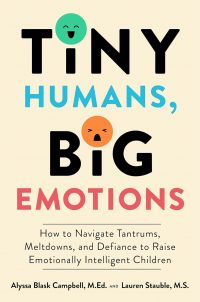Tiny Humans, Big Emotions

Getting information is one part of learning, but there’s a lot more to it. If we want to develop emotional intelligence skills—our own and children’s—we need a method that honors how humans learn.Alyssa Blask Campbell and Lauren Elizabeth Stauble
Overview: Once I picked up this book, I couldn’t put it down! Authors Campbell and Stauble share a clear, practical approach to teaching emotional intelligence skills, and they do it with both authority and warmth. Their method feels authentic and totally doable, even in the messy, unpredictable world of working with young children. I love that they give readers permission to grow along the way and emphasize that self-care isn’t a luxury—it’s essential. After all, we have to be able to regulate our own emotions before we can help kids learn to regulate theirs. big part of that equation.
Who this book is for: Preschool and elementary teachers, as well as parents of young children, will find this book incredibly helpful and encouraging.
Key Takeaways:
- Emotions are unique to each person and shaped by individual experiences.
- Adults must regulate themselves before they can teach regulation to children.
- Moving through different emotional states is a natural, healthy process.
- Learning is more than just absorbing information—it requires readiness and safety.
- Children need foundational skills and a sense of security before new learning will stick.
- If a child isn’t ready, their attention will wander and frustration will follow.
- Hard times are important learning opportunities; rescuing kids too quickly can rob them of growth.
Rating:

Where to buy: Click here to get your copy!